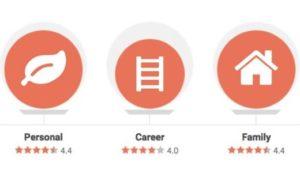Compared to what?: the values (and dangers) of employer rating sites
 Way back in 1996, Vault launched as the first of the employer rating sites. It was the granddaddy! Then Glassdoor launched in 2008 (along with the help of about $3M in pre-launch financing). By 2015, it had a valuation of roughly $1B (along with a total of $160M in investment), and was said to be pre-IPO (which it is to this day). Vault’s and Glassdoor’s innovation? Crowdsourced, anonymous reviews of employers, supplemented by salary information, photos, and – yes, indeed – job listings. In other words, it is actually a job board with ratings.
Way back in 1996, Vault launched as the first of the employer rating sites. It was the granddaddy! Then Glassdoor launched in 2008 (along with the help of about $3M in pre-launch financing). By 2015, it had a valuation of roughly $1B (along with a total of $160M in investment), and was said to be pre-IPO (which it is to this day). Vault’s and Glassdoor’s innovation? Crowdsourced, anonymous reviews of employers, supplemented by salary information, photos, and – yes, indeed – job listings. In other words, it is actually a job board with ratings.
These sites paved the way for a new generation of employer rating sites – that inevitably monetize from job listings and employer ads. The inherent attractiveness of these sites for candidates is the promise they offer: an inside look into potential employers. Particularly if some or all of the content is user-generated, there is a certain level of authenticity that candidates seek out – and (sometimes) employers avoid. Let’s look at some of the sites out there that are competing against Glassdoor:
- Fairygodboss: This content-driven site focuses on the career life of women, with particular emphasis on benefits important to women, work-life balance, and salaries. It also has user-generated content for a Q&A area.
- GreatPlaceToWork: This site actually pushes a specific certification for employers – and those that pass are ‘great places to work’, and can promote themselves as such. A bit of a racket (it can cost employers up to $7500 for certification), but the data is useful to candidates – and it put companies in an ‘apples to apples’ comparison framework.
- InHerSight: Another site focused on working women. InHerSight includes user-submitted rankings, job matching, and a blog.
- Kununu: This German-based site just launched in the U.S., and follows a familiar playbook: user-submitted company reviews, job listings, and the ability for an employer to ‘claim’ their profile.
- TheJobCrowd: This UK-based site seems to focus on just-out-of-college candidates. It includes user-submitted company reviews – with some broken out by candidate reviewers who are apprentices – and of course jobs.
- Comparably: With that name, it pretty much had to be a ratings site, right? In addition to the ratings, it includes user-submitted salary info, which allows candidates to ‘see where they stand’.
- And a few others: Indeed (yes, that Indeed) includes lots of user-generated company reviews; RateMyEmployer.ca is Canada-focused; JobAdvisor.au is Australian-focused; and Completed flips the script a bit and focuses on rating people instead of companies. Finally, there’s Ratedly, which is aimed at the employers; it allows them to monitor all of the bad (and good) stuff that is getting said on the above sites.
As with so many things in life, there is a downside to employer ratings (or probably your site would have some as well!). Just ask Glassdoor, which spent many dollars and hours defending its anonymous ratings system. They won – this time. But face it – employers in general don’t like any publicly available information about themselves that they don’t directly control; candidates do. So you just have to make a judgement call: are employer ratings part of my site’s DNA? Is this kind of unvarnished data something my candidates crave – and my employers are willing to put up with?
One final piece of advice: if you decided to follow the employer rating sites as your guide, make sure you have a good lawyer (and for that matter, you should have a good lawyer, regardless)!
[Want to get Job Board Doctor posts via email? Subscribe here.]. [Check out the JobBoardGeek podcast archive!]
Comments (0)